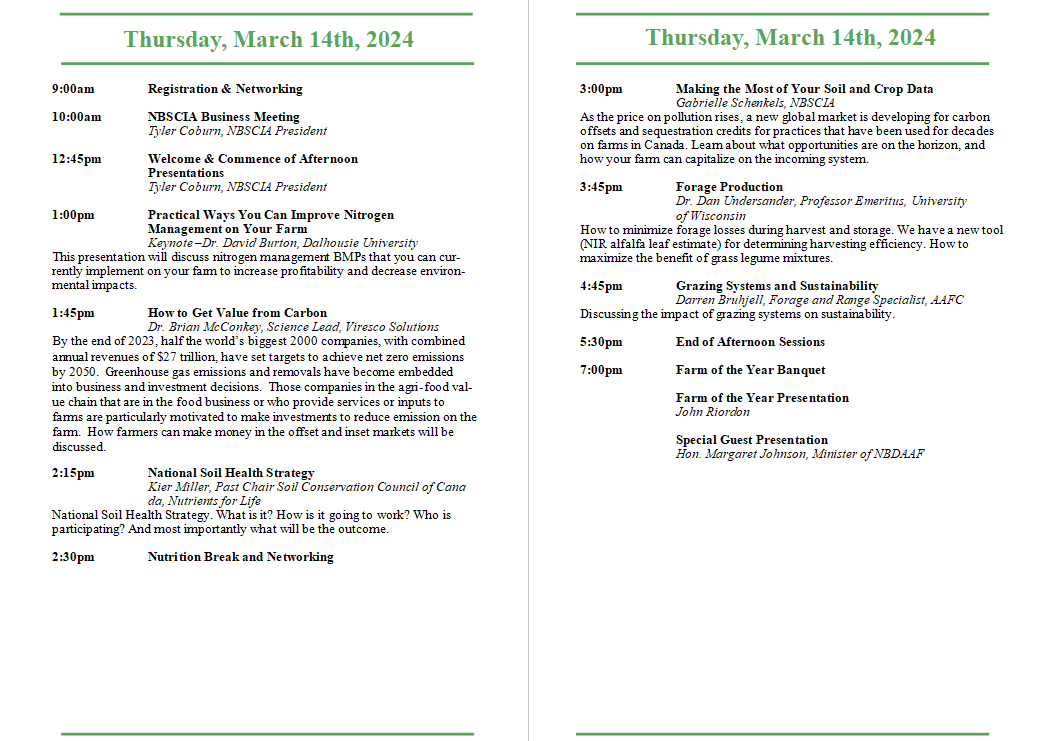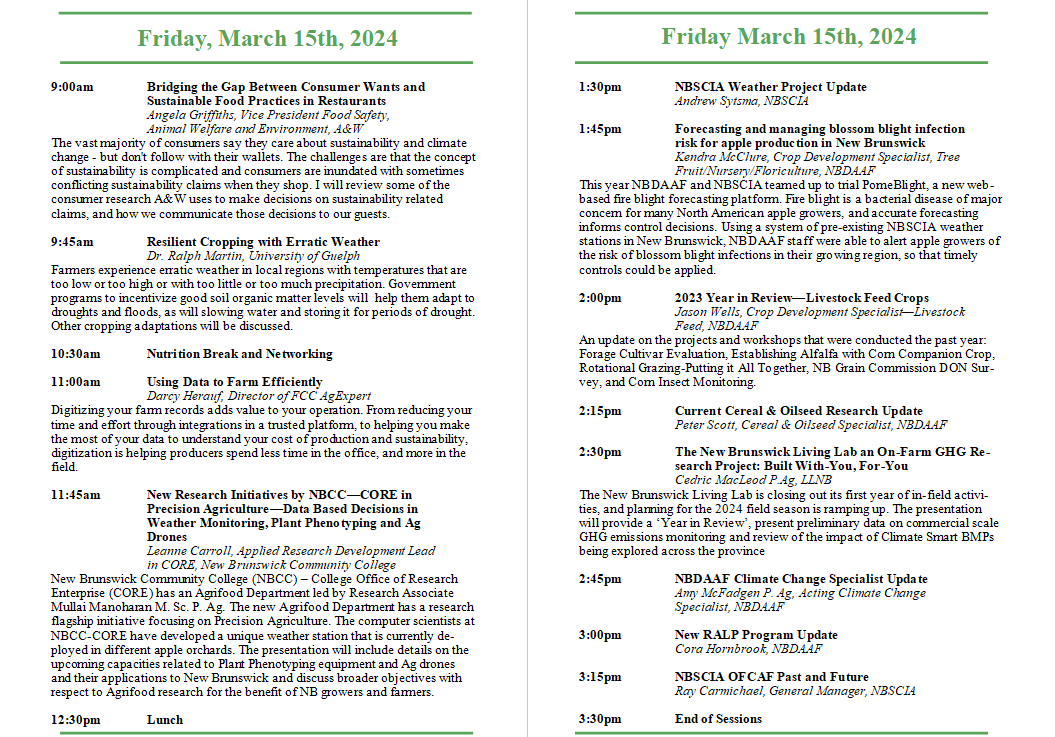NBSCIA
Enhancing Soil & Crop
Sustainability in New Brunswick
NBSCIA 45th Annual General Meeting and Technical Workshop
"Agricultural Resilience: Data Informed Management"
March 14th-15th at the Fredericton Inn, Fredericton, NB
Preview of Presentations



Technical Workshop Speakers
Dr. David Burton
Dalhousie University
Dr. David Burton, is a Soil Scientist and Director of Dalhousie’s Centre for Sustainable Soil Management. His research focuses on the soil nitrogen cycle in the context of soil fertility and environmental impact. His current research examines the production and consumption of greenhouse gases in natural and agricultural landscapes, the development of tools for the measurement of soil nitrogen supply to plants, the influence of climate on soil biological processes, and the assessment of soil health. It is the aim of this work to better understand the factors that control soil microbial processes and to use this information to developing sustainable land management systems in a changing climate.
Dr. Brian McConkey
Science Lead, Viresco Solutions
Dr. Brian McConkey is Chief Scientist for Viresco Solutions Inc, an environmental consulting firm whose vision is “mainstreaming sustainability” by helping our clients in the agriculture value chain to strategically navigate the complex and evolving world of sustainability. Prior to joining Viresco Solutions in 2019, Brian had 33 years of diverse experience in agri-environmental research, technology application, and science policy, with Agriculture and Agri-Food Canada at Swift Current, Saskatchewan.
Kier Miller
Past Chair Soil Conservation Council of Canada, Nutrients for Life
Kier Miller currently lives and farms in Sussex Corner, NB. He attended Nova Scotia Agricultural College and graduated with an Agricultural Engineering Technician Diploma.
He is a long time member of New Brunswick Soil and Crop Improvement Assn and is a past director and secretary treasurer of Kings County Soil and Crop Improvement Assn. He is a director of the New Brunswick Grain Commission and a past director of the Atlantic Grains Council. He is currently Past Chair of the Soil Conservation Council of Canada.
Miller Farms currently focuses on cash cropping, custom work and seed and crop supply sales. His farm is currently 100% no-till, in a corn, soybean, pulses and small grains rotation. Recently added cover crops to the crop plan. Custom work includes planting all kinds of crops, drying grain and combining.
Gabrielle Schenkels
NBSCIA
Gabrielle Schenkels, NBSCIA Northshore Coordinator, has grown up on a dairy farm in Northern NB and recently graduated from Dal AC with a BSc in Agricultural Business. She has spent the last four months dairy farming in New Zealand on a farm exchange, learning about pasture management and carbon farming.
Dr. Dan Undersander
Forage Professor Emeritus, University of Wisconsin
Dr. Dan Undersander has worked as a forage specialist for 50 years. His areas of specialty include forage production, forage harvesting (hay, haylage and baleage), forage analysis, and grazing. He is a fellow of both the American Society of Agronomy and Crop Science Society of America. He has more than 1,800 publications in forage production and utilization. Dan has traveled the world (working in 58 countries) helping farmers improve the quality and yields of their forages in Asia, Europe, North America and South America.
Darren Bruhjell
Forage and Range Specialist, Agriculture and Agri Food Canada
Darren is a Forage and Range Specialist and AAFC Coordinator for the Agrisystems and Regenerative Alberta Living Labs. Over his 30 plus career he has worked as an ecological consultant for over 10 years and for both the Alberta and British Columbia Governments as a Public Land, Forage and Range and Reclamation Specialist. Since 2011 he has worked for AAFC and was the Forage Crops instructor at the University of Alberta from 2016 to 2023.
Angela Griffiths
Vice President of Food Safety, Animal Welfare and Environment, A&W Food Services of Canada Inc.
Angela joined A&W Food Services in June 2016 as the Vice President of Food Safety, Quality Animal Welfare and Environment. She manages Strategy Development at A&W and leads A&W’s Doing What’s Right Strategy and environmental initiatives in our supply chain and 1040+ restaurants. In addition, In August 2021, she joined the Board of Recycle BC and currently Chairs the Governance Committee.
Prior to joining A&W, Angela held the position of Director of Innovation for UL Supply Chain and Sustainability from 2010 to 2016, and prior to that held various director and executive positions in environmental, conservation and consulting firms including the Vancouver Aquarium, The Sheltair Group, Clean Nova Scotia and Jacques Whitford. Angela holds a Bachelor of Science from the University of Western Ontario, a Master of Science in Microbiology and a PhD in Resource Management and Environmental Studies from the University of British Columbia. In her free time, Angela can be found in the mountains of British Columbia with a backpack.
Dr. Ralph Martin
University of Guelph
Ralph C. Martin grew up on his family farm in Wallenstein, ON. After 4-H, his formal education includes, a B.A. and an M.Sc. in Biology from Carleton University and a Ph.D. in Plant Science from McGill University. His research and teaching began at the Nova Scotia Agricultural College, in 1990, when he realized students teach him too. In 2001, he founded the Organic Agriculture Centre of Canada www.dal.ca/faculty/agriculture/oacc/en-home.html to coordinate university research and education pertaining to organic systems, across Canada. In 2011, he was appointed as Professor and the Loblaw Chair in Sustainable Food Production at the Ontario Agricultural College, University of Guelph. In 2019, he retired and published his book, Food Security. More info at www.ralphmartin.ca .
Darcy Herauf
Director of Farm Credit Canada AgExpert
Darcy Herauf is Director of FCC AgExpert, business management software that’s solid, simple and built for the farm. He’s spent almost his entire career at FCC, undertaking leadership roles in finance, marketing and information technology. Darcy’s IT experience and background in agriculture inform his day-to-day work, helping make AgExpert a top choice for business and field management software in Canada.
Leanne Carroll
Applied Research Development Lead in CORE, New Brunswick Community College
Leanne Carroll is Applied Research Development Lead in the College Office of Research Enterprise (CORE) at New Brunswick Community College (NBCC). She collaborates with industry and community partners, researchers, faculty, and students to develop research projects that help solve practical problems. Leanne aims to provide exceptional real-world learning opportunities for NBCC students that also benefit partners in the region. She is based in Fredericton, NB and grew up on a farm (cattle; soybeans, wheat, corn) in southwestern Ontario.
Andrew Sytsma
NBSCIA
Andrew is the NBSCIA coordinator for the Carleton County area and has been with NBSCIA since 2020, first coming on as the Central region coordinator. He completed his BSc in plant and animal science from Dal AC. Andrew is from a family farm near Centreville, NB which he also helps operate.
Kendra McClure
Crop Development Specialist, Tree Fruit/Nursery/Floriculture, New Brunswick Department of Agriculture and Agri Food
Kendra is originally from Saint John New Brunswick, and joined the New Brunswick Department of Agriculture, Aquaculture, and Fisheries in 2023. She supports the NB tree fruit, nursery, and floriculture industries through her collaborative work with her colleagues at NBDAAF. Before joining NBDAAF she worked for Perennia Food and Agriculture Corporation, a provincial development agency that supports Nova Scotia’s agriculture, seafood, and food and beverage sectors. Kendra completed an M.Sc. and Ph.D. in Plant Agriculture through the University of Guelph OAC, where she focused on horticulture and plant breeding and genetics.
Cedric MacLeod, MSc., P.Ag
Living Labs New Brunswick
Born and raised in Carleton County, Cedric MacLeod developed an early love for agriculture with encouragement from family and pouring concrete with his father on farms throughout the Saint John River Valley. A desire to support soil health and conservation opportunities in the New Brunswick potato belt led Cedric towards the completion of a Bachelor of Science from the Nova Scotia Agricultural College and a Masters Degree from the University of Manitoba, Department of Soil Science.
Early career experience immersed Cedric in the agricultural greenhouse gas management field where he has led or contributed to the development of numerous Canadian and international GHG quantification protocols in the livestock and cropping sectors.
With 20-years of experience in GHG management, Cedric was asked to lead the development of New Brunswick’s 5-year Living Lab project which will reach across New Brunswick with research and extension efforts to support growers in adopting Climate Smart management practices and enhance biodiversity on their operations.
Cedric operates a grass-fed beef and annual crop production operation in Centreville, New Brunswick with his wife Alanda, son Kalen and support from parents, siblings, nieces and nephews.
Ray Carmichael
General Manager, NBSCIA
Mr. Carmichael holds a MSc in Ag. Macdonald College, McGill University. Before embarking on a career in private consulting he served as a field crop specialist with the Plant Industry Branch, New Brunswick Department of Agriculture and Crop Supervisor for the Prince Edward Island Department of Agriculture responsible for supervising crop extension specialists, development and implementation of Departmental programs to support production of all crop commodities. In private consulting he assisted agri-food value chain stakeholders in areas of business planning and development, information management, food safety and security, financing and specialized, in geo-referenced (Precision Farming) crop management services for potatoes and rotational crops.
Since 2015 Ray has served as a soil and crop management Agrologist with the New Brunswick Soil and Crop Improvement Association (NBSCIA). After NBSCIA was accepted as an implementation partner for New Brunswick by Agriculture and Agrifood Canada in 2022 to deliver the On Farm Climate Action Fund, he assumed the role of NBSCIA- OFCAF Manager, supporting farmers in adopting BMP practices to re- duce greenhouse gas emissions and sequester carbon.
Special Guest Speaker
Hon. Margaret Johnson
Minister of Agriculture Aquaculture and Fisheries
Margaret Johnson was elected for a first time to the 60th Legislative Assembly on September 14th, 2020 for the riding of Carleton-Victoria. She was appointed as the Minister of Agriculture, Aquaculture, and Fisheries on September 29th, 2020.
A resident of Carleton County for nearly five decades, Ms. Johnson was first elected to represent Carleton-Victoria in 2020.
Having lived on Carleton County for the majority of her life, she has long been a promoter of all things local. In her community she is an avid supporter of the arts, visual, musical and textile.
She is actively engaged in numerous organizations, assuring with youth athletics, charity work and community events.
Her belief has always been that you get out of something, what you put into it and that you should always leave a place better than you found it.
Living Labs NB Workshops
Living Lab - Digital Agriculture for NB: Opportunities Exploration Workshop
Tuesday, March 12th 8:00am - 5:00pm
Hands-on event exploring cutting edge remote sensing technology in agriculture
Green House Gas Mitigation for New Brunswick Agriculture
Agronomy Training Workshop
Wednesday, March 13th 8:30am - 5:30pm
Join us for a greenhouse gas training workshop, geared toward industry professionals, featuring the latest research from leading experts on advanced carbon and nitrogen management practices, how NBLL research relates to other provincial and federal climate smart programming, and the role of the agronomy community in reducing barriers to BMP adoption. This event will offer CCA credits.
